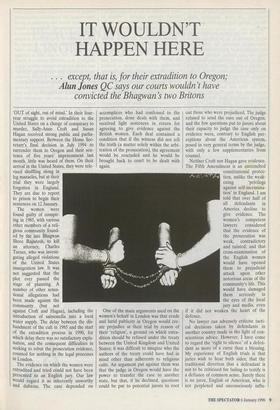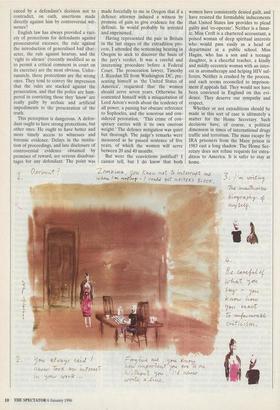IT WOULDN'T HAPPEN HERE
. . . except, that is, for their extradition to Oregon; Alun Jones QC says our courts wouldn't have convicted the Bhagwan's two Britons The evidence on which the women were extradited and tried could not have been presented to an English jury. Our law would regard it as inherently unworthy and dubious. The case depended on accomplices who had confessed to the prosecution, done deals with them, and received light sentences in return for agreeing to give evidence against the British women. Each deal contained a condition that if the witness did not tell the truth (a matter solely within the arbi- tration of the prosecution), the agreement would be rescinded and he would be brought back to court to be dealt with again.
One of the main arguments used on the women's behalf in London was that crude and lurid publicity in Oregon would cre- ate prejudice at their trial by reason of their 'religion', a ground on which extra- dition should be refused under the treaty between the United Kingdom and United States; it was difficult to imagine who the authors of the treaty could have had in mind other than adherents to religious cults. An argument put against them was that the judge in Oregon would have the power to transfer the case to another state, but that, if he declined, questions could be put to potential jurors to root out those who were prejudiced. The judge refused to send the case out of Oregon; and the few questions put to jurors about their capacity to judge the case only on evidence were, contrary to English per- ceptions about the American system, posed in very general terms by the judge, with only a few supplementaries from counsel.
Neither Croft nor Hagan gave evidence. The Fifth Amendment is an entrenched constitutional protec- tion, unlike the weak- No lawyer can adversely criticise tacti- cal decisions taken by defendants in another country made in the light of con- scientious advice. However, I have come to regard the 'right to silence' of a defen- dant as more of a curse than a blessing. My experience of English trials is that juries wish to hear both sides; that the traditional direction that a defendant is not to be criticised for failing to testify is a defiance of common sense. Surely there is no juror, English or American, who is not perplexed and unconsciously influ- enced by a defendant's decision not to contradict, on oath, assertions made directly against him by controversial wit- nesses? English law has always provided a vari- ety of protections for defendants against prosecutorial excesses; the rule against the introduction of generalised bad char- acter, the rule against hearsay, and the `right to silence' (recently modified so as to permit a critical comment in court on its exercise) are the most obvious. Unfor- tunately, these protections are the wrong ones. They tend to convey the impression that the rules are stacked against the prosecution, and that the police are ham- pered in convicting those they 'know' are really guilty by archaic and artificial impediments to the presentation of the truth. This perception is dangerous. A defen- dant ought to have strong protections, but other ones. He ought to have better and more timely access to witnesses and forensic evidence. Delays in the institu- tion of proceedings, and late disclosure of controversial evidence obtained by promises of reward, are serious disadvan- tages for any defendant. The point was made forcefully to me in Oregon that if a defence attorney induced a witness by promise of gain to give evidence for the defence, he would probably be arrested and imprisoned. Having represented the pair in Britain in the last stages of the extradition pro- cess, I attended the sentencing hearing in Oregon to seek to discover the basis of the jury's verdict. It was a careful and interesting procedure before a Federal Court. The prosecution lawyer, Timothy J. Riordan III from Washington DC, pre- senting himself as 'the United States of America', requested that the women should serve seven years. Otherwise he contented himself with a misquotation of Lord Acton's words about the tendency of all power, a passing but obscure reference to Sophocles, and the sonorous and con- sidered peroration, 'This crime of con- spiracy carries with it its own onerous weight.' The defence mitigation was quiet but thorough. The judge's remarks were measured as he passed sentence of five years, of which the women will serve between 20 and 40 months. But were the convictions justified? I cannot tell, but I do know that both women have consistently denied guilt, and have resisted the formidable inducements that United States law provides to plead guilty and 'co-operate'. Neither is a fanat- ic. Miss Croft is a chartered accountant, a poised woman of deep spiritual interests who would pass easily as a head of department at a public school. Miss Hagan, who has a son and a teenage daughter, is a cheerful teacher, a kindly and mildly eccentric woman with an inter- est in aromatherapy and helping HIV suf- ferers. Neither is crushed by the process, and each seems reconciled to imprison- ment if appeals fail. They would not have been convicted in England on this evi- dence. They deserve our sympathy and respect. Whether or not extraditions should be made in this sort of case is ultimately a matter for the Home Secretary. Such decisions have, of course, a political dimension in times of international drugs traffic and terrorism. The mass escape by IRA prisoners from the Maze prison in 1983 cast a long shadow. The Home Sec- retary does not refuse requests for extra- dition to America. It is safer to stay at home.



















































 Previous page
Previous page